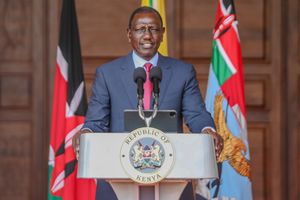Initiatives by KPC to domesticate environmental, social, and governance values
Sponsored by Kenya Pipeline Company

KPC team led by the then Foundation Manager, Bernice Lemedeket, during a mangrove planting occasion at Jomvu, Mombasa, jointly with Kenya Forest Service.
Today, as environmental, social, and governance (ESG) questions are imposed upon corporate plans, companies are best positioned to pivot away from treating ESG as merely a compliance, philanthropic, or corporate social responsibility tool. The ESG imperative requires organisations to define their mandates', social and environmental impact on their operations and the publics they serve. This is because stakeholders, customers, shareholders, regulators, and the society, are now focused on sustainability than just pure profitability.
In line with this, Kenya Pipeline Company (KPC) recognises its responsibility to ensure all reasonable steps are taken to protect and preserve the environment in which it operates. In so doing, hazards are removed and controlled, health preservation and injury protection of its employees ensured, and contractor workers, customers, and all its stakeholders guided on safety.
KPC complies with legislative sanctions such as provided in the Environment Management and Coordination Act 1999, Cap 387; Occupational Safety and Health Act 2012, Cap 514; Energy Act 2012, Cap 314; and Water Act 2016, among other relevant legal instruments.
KPC has equally committed to international certification in Health Safety and Environment (HSE) management for ISO 14001:2015 Environmental Management standard and the 45001:2015 on Occupational Health and Safety; ISO 17025 on Laboratory Management and ISO 9001:2015 on Quality Assurance. These international certifications ensure that KPC standards exceed local legislative requirements as required in HSE Management.
ESG demands a critical appreciation and understanding of the key issues that affect communities within which organisations operate, and offer solutions that generate hope. Corporates must thus meaningfully engage as they direct their social investments sustainably in line with their strategic configurations. The impact on education, health, and infrastructure, among others, should be key considerations in an organisation’s strategic vision. Creating a pipeline of a healthy, connected and well-skilled future workforce creates a more positive and lasting impact on society, more than profits for profit’s sake.
Under the United Nation’s (UN) Sustainable Development Goals target 12.6, countries are required to facilitate and encourage companies to adopt sustainable practices by integrating them in their reporting cycles.
Through Corporate Social Investment (CSI), organisations can achieve sustainable development in Kenya. CSI is a business concept that continues to inform corporate strategies in terms of sustainable development. KPC has consistently set aside one percent of its Profit Before Tax in support of Corporate Social Investment activities, annually. The organisation has set aside resources, not only to the communities along our pipeline easement, but also to communities across the entire country, as a way of co-dependence with the society that hosts the Company’s infrastructure. KPC has aligned its strategy and CSI programmes with the government’s agenda borne in Vision 2030.
Sustainability compels organisations to prioritise increased and high-level accountability and transparency, not only to the key shareholders, but the community at large. Such openness makes it easier for an organisation to appropriately, in partnership with the community and stakeholders, respond consistently to potential environmental and health hazards associated with the business, since it is much easier to communicate the impact of the business to the society, without having to justify its existence in times of a crisis.
KPC management has ensured involvement of all its staff in annual safety reporting cycles by instituting feedback mechanisms for near miss incidents, unsafe conditions and acts, and all potential hazards, companywide. This has enhanced safety at the workplace and mitigated harm to the neighbouring ecosystem of people and environment.
Sustainable growth also encompasses the use of environmentally responsible and efficient operational practices that preserve environmental resources crucial for long-term business performance.
Over the years, KPC has partnered with various stakeholders such as Kenya Forest Service, to help fight climate change through planting of nearly 300,000 trees in various counties across the country. It has also supported conservation efforts amongst communities adjacent to the wayleave or pipeline easement.
Guided by the National Climate Change Action Plan 2018-2022, KPC has aligned its adaptation and mitigation programmes on climate change to meet the nationally determined contributions (NDC) whose aim is the reduction of the national emission of Greenhouse Gases (GHG) as espoused in the Paris Agreement of 2015. As such, KPC is installing a 150kw solar plant at its headquarters in Nairobi to provide clean energy. The project is envisaged to be completed by December 2022.
To further mitigate against operational GHG emissions, KPC has been retrofitting its spirit product tanks from single floating roof type, to dome roof with floating roof, conversions which began in 2021. Plans are underway to retrofit three more tanks within the financial years running from 2022-23. In addition, all tanks constructed since 2016 after the enactment of the Climate Change Act have been dome-roofed with higher efficiency in curbing fugitive emissions from the storage tanks.
KPC has also invested in low-carbon energy efficiency technologies through installations of Variable Frequency Drive (VFD) that limit the energy consumption of the mainline pump, i.e., energy efficiency meters whose investment costs will be recouped over time through green climate funding grants and carbon credit sales for GHGs avoidance, under the Kyoto Protocol.
The latest Energy Audit of KPC facilities returned an enviable energy-saving record of 97,194,359.26Kwh per annum, resulting in a reduction of 52,1933 CO2 emissions and cost-saving of Ksh875,999,807.43 per annum.
These actions clearly show that KPC is an industry leader in the implementation of the country’s climate change policies and a pillar in the United Nations Framework Convention on Climate Change (UNFCC).
Having been invigorated through its annual participation in the climate change negotiation processes that occurred this year at COP27, KPC is committed to further the national government’s sustainability and clean energy adaptation agenda by continuing to operate in a mutually beneficial paradigm to both society and its business stakeholders.


